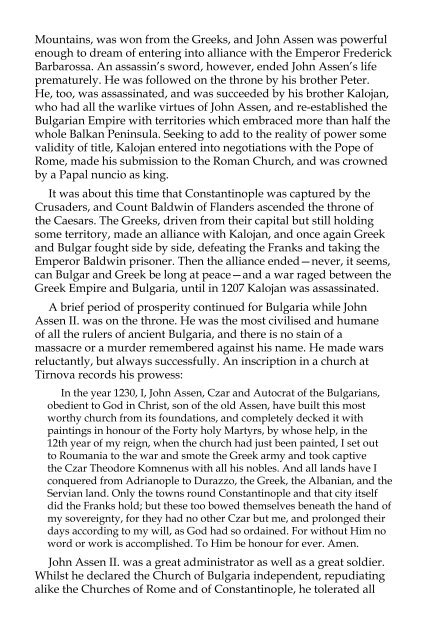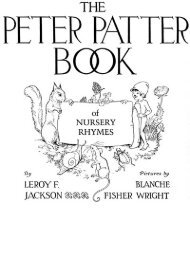Bulgaria e-book - iMedia
Bulgaria e-book - iMedia
Bulgaria e-book - iMedia
Create successful ePaper yourself
Turn your PDF publications into a flip-book with our unique Google optimized e-Paper software.
Mountains, was won from the Greeks, and John Assen was powerful<br />
enough to dream of entering into alliance with the Emperor Frederick<br />
Barbarossa. An assassin’s sword, however, ended John Assen’s life<br />
prematurely. He was followed on the throne by his brother Peter.<br />
He, too, was assassinated, and was succeeded by his brother Kalojan,<br />
who had all the warlike virtues of John Assen, and re-established the<br />
<strong>Bulgaria</strong>n Empire with territories which embraced more than half the<br />
whole Balkan Peninsula. Seeking to add to the reality of power some<br />
validity of title, Kalojan entered into negotiations with the Pope of<br />
Rome, made his submission to the Roman Church, and was crowned<br />
by a Papal nuncio as king.<br />
It was about this time that Constantinople was captured by the<br />
Crusaders, and Count Baldwin of Flanders ascended the throne of<br />
the Caesars. The Greeks, driven from their capital but still holding<br />
some territory, made an alliance with Kalojan, and once again Greek<br />
and Bulgar fought side by side, defeating the Franks and taking the<br />
Emperor Baldwin prisoner. Then the alliance ended—never, it seems,<br />
can Bulgar and Greek be long at peace—and a war raged between the<br />
Greek Empire and <strong>Bulgaria</strong>, until in 1207 Kalojan was assassinated.<br />
A brief period of prosperity continued for <strong>Bulgaria</strong> while John<br />
Assen II. was on the throne. He was the most civilised and humane<br />
of all the rulers of ancient <strong>Bulgaria</strong>, and there is no stain of a<br />
massacre or a murder remembered against his name. He made wars<br />
reluctantly, but always successfully. An inscription in a church at<br />
Tirnova records his prowess:<br />
In the year 1230, I, John Assen, Czar and Autocrat of the <strong>Bulgaria</strong>ns,<br />
obedient to God in Christ, son of the old Assen, have built this most<br />
worthy church from its foundations, and completely decked it with<br />
paintings in honour of the Forty holy Martyrs, by whose help, in the<br />
12th year of my reign, when the church had just been painted, I set out<br />
to Roumania to the war and smote the Greek army and took captive<br />
the Czar Theodore Komnenus with all his nobles. And all lands have I<br />
conquered from Adrianople to Durazzo, the Greek, the Albanian, and the<br />
Servian land. Only the towns round Constantinople and that city itself<br />
did the Franks hold; but these too bowed themselves beneath the hand of<br />
my sovereignty, for they had no other Czar but me, and prolonged their<br />
days according to my will, as God had so ordained. For without Him no<br />
word or work is accomplished. To Him be honour for ever. Amen.<br />
John Assen II. was a great administrator as well as a great soldier.<br />
Whilst he declared the Church of <strong>Bulgaria</strong> independent, repudiating<br />
alike the Churches of Rome and of Constantinople, he tolerated all<br />
religions and gave sound encouragement to education. With his<br />
death passed away the last of the glory of ancient <strong>Bulgaria</strong>. Her story<br />
now was to be of almost unrelieved misfortune until the culminating<br />
misery of the Turkish conquest.<br />
Internal dissensions, wars with the Venetians, the Hungarians,<br />
the Serbs, the Greeks, the Tartars,—all these vexed <strong>Bulgaria</strong>. The<br />
country became subject for a time to the Tartars, then recovered<br />
its independence, then came under the dominion of Servia after<br />
the battle of Kostendil (1330). The Servians, closely akin by blood,<br />
proved kind conquerors, and for some years the two Slav peoples<br />
of the Balkans kept peace by a common policy in which <strong>Bulgaria</strong>,<br />
if dependent, was not enslaved. But the Turk was rapidly pouring<br />
into Europe. In 1366 the <strong>Bulgaria</strong>n Czar, Sisman III., agreed to<br />
become the vassal of the Turkish Sultan Murad, and the centuries<br />
of subjection to the Turk began. After the battle of Kossovo the grip<br />
of the Turk on <strong>Bulgaria</strong> was tightened. Tirnova was captured, the<br />
nobles of the nation massacred, the national freedom obliterated. The<br />
desire for independence barely survived. But there was one happy<br />
circumstance:<br />
“It is a noteworthy fact,” writes a <strong>Bulgaria</strong>n authority, “that the<br />
Osmanlis, being themselves but little civilised, did not attempt to<br />
assimilate the <strong>Bulgaria</strong>ns in the sense in which civilised nations try to<br />
effect the intellectual and ethnic assimilation of a subject race. Except<br />
in isolated cases, where <strong>Bulgaria</strong>n girls or young men were carried off<br />
and forced to adopt Mohammedanism, the Government never took<br />
any general measures to impose Mohammedanism or assimilate the<br />
<strong>Bulgaria</strong>ns to the Moslems. The Turks prided themselves on keeping<br />
apart from the <strong>Bulgaria</strong>ns, and this was fortunate for our nationality.<br />
Contented with their political supremacy and pleased to feel themselves<br />
masters, the Turks did not trouble about the spiritual life of the rayas,<br />
except to try to trample out all desires for independence. All these<br />
circumstances contributed to allow the <strong>Bulgaria</strong>n people, crushed and<br />
ground down by the Turkish yoke, to concentrate and preserve their own<br />
inner spiritual life. They formed religious communities attached to the<br />
churches. These had a certain amount of autonomy, and, beside seeing<br />
after the churches, could keep schools. The national literature, full of the<br />
most poetic melancholy, handed down from generation to generation<br />
and developed by tradition, still tells us of the life of the <strong>Bulgaria</strong>ns<br />
under the Ottoman yoke. In these popular songs, the memory of the<br />
ancient <strong>Bulgaria</strong>n kingdom is mingled with the sufferings of the present<br />
hour. The songs of this period are remarkable for the Oriental character<br />
of their tunes, and this is almost the sole trace of Moslem influence.<br />
“In spite of the vigilance of the Turks, the religious associations served





